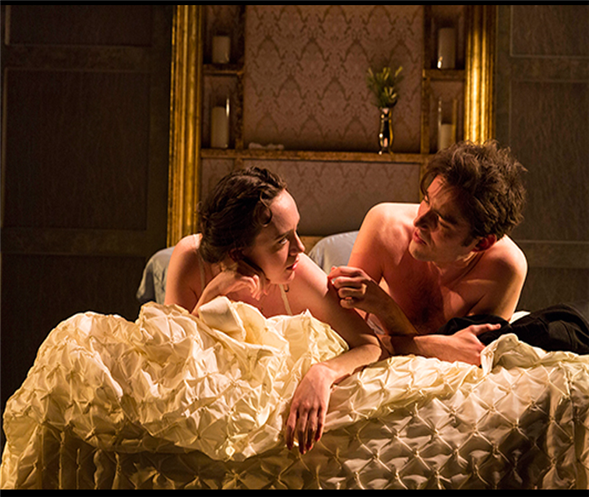Contemporary audiences sometimes expect classic dramas to be updated for modern times, but that's not
Red Bull Theater's approach. The 12-year-old company --- whose primary mission is to stage Jacobean-era plays by Shakespeare and his contemporaries --- is currently mounting a lively and faithful production of John Ford's
'Tis Pity She's a Whore at the Duke on 42nd Street, directed by Red Bull's artistic director Jesse Berger.
Despite being one of the better-known dramas from its day,
'Tis Pity, which riffs on themes of illicit love like the Bard's
Romeo and Juliet, is infrequently done. (The last New York City production of note was
at the Public Theater in 1992, directed by JoAnne Akalaitis and starring Val Kilmer.) In fact, Berger has been waiting to produce the play since founding Red Bull in 2003. "I wanted us to do
'Tis Pity when we were really ready to do it to the best of our abilities," he says. As for why Ford's drama is not staged more often, Berger chalks it up to theatregoers being less aware of Shakespeare's counterparts. "If it's an unfamiliar play
and it's 400-years-old? Audiences are like 'No,'" he jokes.
Nevertheless, Red Bull has found loyal audiences for its productions, and
'Tis Pity is no exception. "I do love new plays!" Berger insists. "But I find it deeply resonant to hear and experience stories in the theatre from the past, because they provide an allegory to our own lives. I like to be confronted by how much history has changed --- and
not changed --- through the centuries."
To that end,
'Tis Pity explores the timeless themes of love, taboo and revenge as a brother and sister, Giovanni and Annabella, discover their mutual attraction. "The play is really about love and the dangers of passions that are taken to the extreme," Berger says. "Ultimately we are left asking, 'How do we channel our passions in ways that don't destroy society?' But also, 'How do we keep society from destroying our passions?'"
{Image2}
That said, Berger refuses to make explicit parallels to modern culture. "I want audiences to draw their own analogies to contemporary life," he says, adding that he's less interested in making a political statement than in "really evoking and engaging with the audience's intellect and imagination."
For
'Tis Pity, Berger's tools of engagement include a strong ensemble of actors (led by Matthew Amendt and Amelia Pedlow as the smitten siblings), a set by David M. Barber that allows for swift entrances and exits, and a direct, unaffected approach to the text. "Some of the language in this play is the most beautiful that has ever been written for the theatre," says Berger. "But we are not using it to speak poetry but to speak dramatic verse."
The last and perhaps sharpest tool in Berger's box is a sense of playfulness. "We always get so
serious about classical theatre, but they were having so much fun!" he says. "Shakespeare's Globe Theatre was down the road from arenas for animal blood sports. So we really try to have a playful and passionate and theatrical approach to this question: 'Who tells you whom you have the right to love?'"
---
Eliza Bent is a Brooklyn-based writer and performer
Photos by Richard Termine